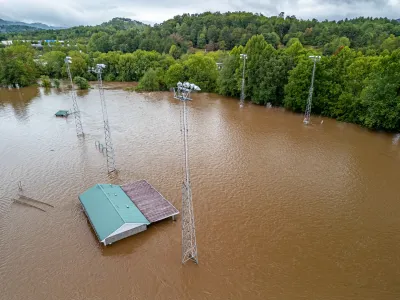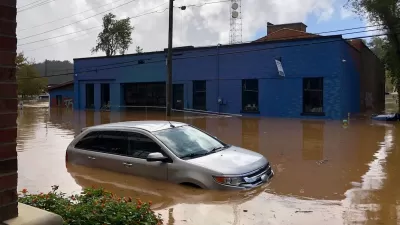The state will field bids to demolish, repair and rebuild homes in the mountains. After struggles in eastern NC, officials aim to chart a different course.

This article by Galen Bacharier is republished from NC Newsline. It has been shortened.
As she briefed contractors about their upcoming bids to rebuild housing in western North Carolina last week, a state official laid out a candid assessment of the mission ahead.
“We need you, desperately, to build those homes and get people home,” said Angie Dunaway, the director of contracting for the NC Department of Commerce’s new team leading Hurricane Helene recovery efforts.
In early May, the state will begin fielding offers from companies to demolish, repair and rebuild homes destroyed by the deadliest storm in North Carolina history.
It is a monumental task in both scope and logistics. The western mountains will require “some special type of building,” Dunaway told contractors. And the capital involved will be immense — including more than $1.4 billion in federal money from the U.S. Department of Housing and Urban Development.
Gov. Josh Stein has taken a different route than his predecessor, former Gov. Roy Cooper, and spun up new teams to spearhead recovery for Helene. He and his top lieutenants have said they intend for those teams to be smaller and leaner — making private sector contracts all the more critical.
Jonathan Krebs, Stein’s advisory for western North Carolina, told contractors they are aiming to be “swinging hammers at the first homes in July.”
State is leaning on contractors for rebuild. Here’s what they’re asking of them
Instead of hiring dozens of new state workers to oversee rebuilding efforts, Stein’s administration is bringing on a contractor to manage the day-to-day operations.
State officials are aiming to contract around 25 companies for home demolition, repair and rebuild (hundreds of bids are expected). Those contracts will be for at least three years, but up to six, with one-year renewal options.
In eastern North Carolina, rebuilding dragged on in part because of customizable homes with various layouts. That won’t be an option for homeowners this time. The state is planning to have a limited set of layouts — two-, three- and four-bedroom floor plans, all with two bathrooms — that will be provided by contractors and reused throughout the program.
The administration is also doing away with long-term hotel stays that racked up costs and infuriated legislators during rebuild efforts in the east.
Relocation will happen as a “last resort” and only in “extreme” circumstances.
FEMA denied North Carolina’s request for permanent housing earlier this year
Earlier this year, North Carolina sought another avenue for rebuilding homes in the mountains — FEMA.
The agency’s housing assistance program offers permanent repairs or new construction for households after disasters, depending on specific circumstances and eligibility. North Carolina applied for that construction, but the request was denied by FEMA.
“[Permanent housing construction] would not be an appropriate form of direct housing as alternative housing options in North Carolina exist,” FEMA disaster recovery manager Brett Howard wrote in an internal memo sent to administrators Feb. 26 and obtained by NC Newsline.
Stein’s communications director, Kate Frauenfelder, confirmed that the governor’s office had requested the program in January. FEMA told them they no longer had the authority to issue permanent housing construction “except in extreme circumstances.”
As of April 22, 5,298 North Carolina households are receiving rental assistance, according to joint state and federal data. Another 216 are in mobile homes or trailers; 31 are in FEMA-leased properties, and 18 are in hotels or transitional shelter.
FEMA did not respond to a request for comment on its denial of the program, which has not been previously reported. In a news release last week, the agency touted its grants sent to North Carolina and its communities since January.
The agency recently denied a request from the state to extend its 100% reimbursement rate for debris removal and emergency services. Those rates now stand at 90%. North Carolina is appealing that decision.
NC Newsline is part of States Newsroom, a nonprofit news network supported by grants and a coalition of donors as a 501c(3) public charity. NC Newsline maintains editorial independence. Contact Editor Rob Schofield for questions: [email protected].
FULL STORY: ‘Quality work, fast’: NC gears up for homebuilding after Helene, trying to avoid past pitfalls

Maui's Vacation Rental Debate Turns Ugly
Verbal attacks, misinformation campaigns and fistfights plague a high-stakes debate to convert thousands of vacation rentals into long-term housing.

Planetizen Federal Action Tracker
A weekly monitor of how Trump’s orders and actions are impacting planners and planning in America.

San Francisco Suspends Traffic Calming Amidst Record Deaths
Citing “a challenging fiscal landscape,” the city will cease the program on the heels of 42 traffic deaths, including 24 pedestrians.

Defunct Pittsburgh Power Plant to Become Residential Tower
A decommissioned steam heat plant will be redeveloped into almost 100 affordable housing units.

Trump Prompts Restructuring of Transportation Research Board in “Unprecedented Overreach”
The TRB has eliminated more than half of its committees including those focused on climate, equity, and cities.

Amtrak Rolls Out New Orleans to Alabama “Mardi Gras” Train
The new service will operate morning and evening departures between Mobile and New Orleans.
Urban Design for Planners 1: Software Tools
This six-course series explores essential urban design concepts using open source software and equips planners with the tools they need to participate fully in the urban design process.
Planning for Universal Design
Learn the tools for implementing Universal Design in planning regulations.
Heyer Gruel & Associates PA
JM Goldson LLC
Custer County Colorado
City of Camden Redevelopment Agency
City of Astoria
Transportation Research & Education Center (TREC) at Portland State University
Jefferson Parish Government
Camden Redevelopment Agency
City of Claremont





























